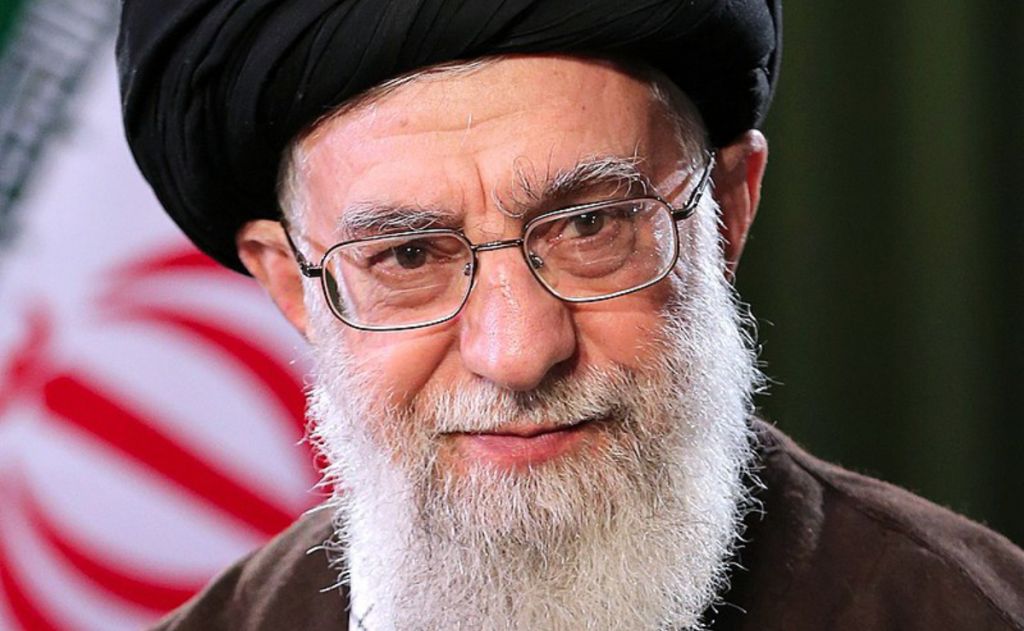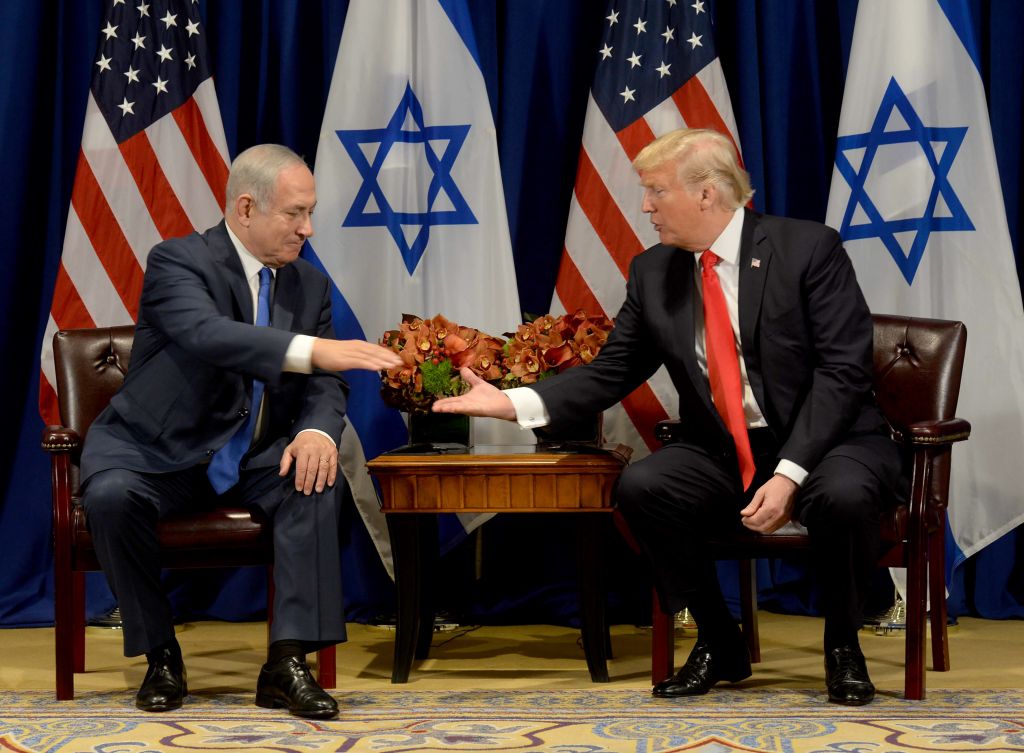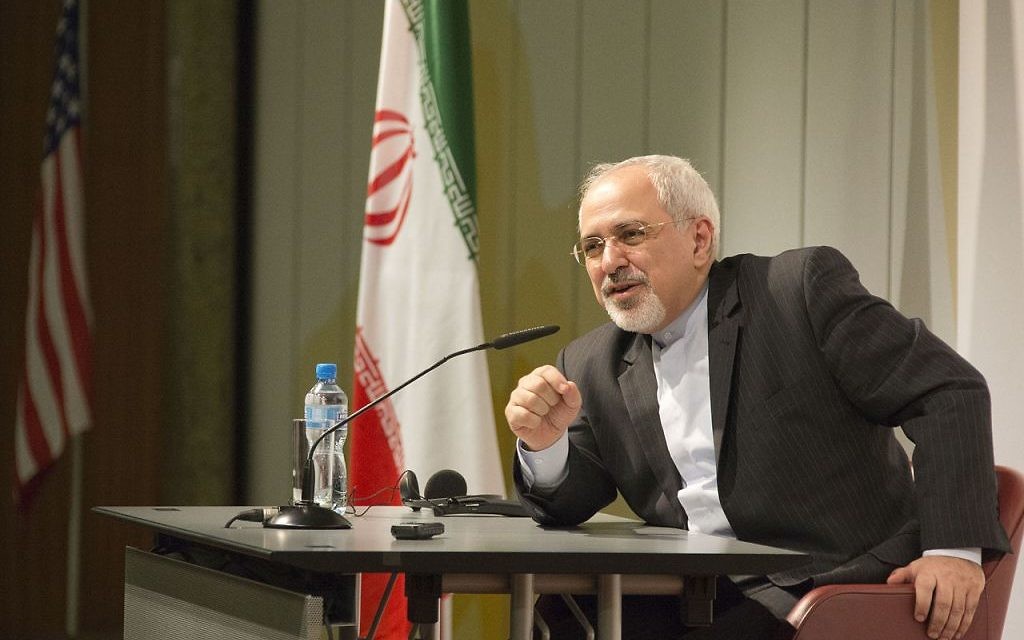Analysts warn Israel and US not to ‘play with fire’ on Iran
As President Donald Trump ratchets up the tension with sanctions against Iran's leader, what does it mean for the wider region, and Israel?
Few thought they had heard the last of Iran when the nuclear deal was signed in 2015. Sure enough, the Islamic Republic is once again taking centre-stage, amid renewed talk of war.
Things are certainly heating up. Drones have been downed. Cyber-attacks have been launched. Oil tankers have been attacked in the world’s busiest shipping lane. Nuclear threats have been issued. And the US has just sent 2,500 troops to the region, along with four B-52 bombers, Patriot missile batteries and an aircraft carrier armed with 44 of its best fighter jets.
Still, US President Donald Trump does not want a war with Iran, in part because he wants to be re-elected in 2020 and his supporters would not countenance another US military foray in the Middle East. But John Bolton, his hawkish national security adviser, and Secretary of State Mike Pompeo, a gung-ho former CIA chief, both seem itching to go, and Iran is not shirking the challenge.
Get The Jewish News Daily Edition by email and never miss our top stories Free Sign Up
“We’re in a very risky and unstable situation,” says Dr Raz Zimmt, a research fellow at the Institute for National Security Studies (INSS) specialising in Iran. “Iranian leaders see no point negotiating with Trump, but they also don’t want war. What’s left is what Ayatollah Khamenei calls resistance. This means breaking their commitments under the nuclear deal, but I don’t think they will break out for a nuclear weapon. They know this would invite a major US military attack.”

Others say Iran may still choose to do so. “Should it decide to go down the confrontation and escalation route, the Islamic regime has two main options at its disposal,” says Yaakov Lappin of the Begin-Sadat Center for Strategic Studies. “The first is destabilising the region through its proxies and through operations by the Islamic Republican Guard Corps (IRGC). The second is restarting its nuclear programme.”
The one supports the other, says former Israeli National Security Advisor, Maj. Gen. (res.) Yaakov Amidror. He thinks the short-term Iranian plan is to surround Israel with well-armed proxies to deter Israel from attacking Iran, while the long-term plan is to protect those proxies with an Iranian nuclear umbrella.
Amidror describes this strategy as “the North Korea doctrine” insofar as South Korea is deterred from attacking the North because of the North’s nukes. On the proxies, he says: “The Iranians are building these capabilities throughout the region so we’ll lose our flexibility of action. We need to do everything to prevent that, even at the risk of war.”

Yet Sir Richard Dalton, Britain’s former ambassador to Iran, dismisses the idea of Tehran pursuing nuclear weapons as nonsense. “It knows it faces US and Israeli nuclear weapons and its strategic calculation is that it invites attack if it pursues its own. That said, it was utter folly for Israel, the US and the Saudis to sabotage the deal, since this removes any fundamental state interest to not develop nuclear weapons.”
Of the proxies Amidror worries about, the most dangerous by far is Hezbollah, and Dalton says Israel’s calculations will be at least partly based on the possibility of a Hezbollah attack on northern Israel. “Israel must feel restrained by that, so you’d expect it to be cautious, but that doesn’t appear to be the case. Sabotaging the nuclear deal has made it less safe. Now it is left wondering whether one provocative move could start a chain reaction which leads to a regional war.”
Zimmt agrees that Iran can cause a lot of problems. “It will make sure everyone knows that if the pressure continues, it will not be the only one to pay the price,” he says. “Don’t play with fire.” As such, Israel “does not want a military confrontation with Iran,” says Zimmt. “Israel wants the US to keep applying pressure to get a better nuclear deal with more restrictions, limit Iran’s ballistic missiles and end its support for militias in the region.”
Israel also wants Russian help to drive Iran out of Syria, which is why the Americans and Russians met in Israel this week. Benjamin Netanyahu thinks Vladimir Putin will help kick Iran out if he gets something from the US in return, such as sanctions relief or US recognition of Bashar al-Assad’s regime. Either way, Bibi will be trying to engineer a “grand bargain,” says Ofer Zalzberg, a senior analyst with the International Crisis Group.

Photo by Avi Ohayon/GPO via JINIPIX
“The Russians could disrupt Iranian routes through Syria, though it may not be as easy as it thinks,” says Professor Ali Ansari, an expert on Iran at the Unversity of St Andrews. “Iran is unwilling to relinquish its gains in Syria, but Russia is inclined to have Iran out of Syria in any significant way and there is likely to be much jockeying for position between the two powers. Russia certainly has leverage with Iran, probably more than any other country.”
Zimmt thinks it is a matter of timing. “I don’t think Russia wants the Iranians to leave just yet. It still needs them. The war is not yet finished and Assad is still weak. But Russia doesn’t want a permanent Iranian presence or influence in Syria either.”
Whether Russia plays a role in any future war between the US and Iran is not yet known, but the question may soon arise. Last week Trump made the last-minute decision to abort a military response to Iran’s shooting down of a US drone. “Had that drone been a manned aircraft, we could now be at war,” says Dalton. “But Trump does not want war, and recently said how ‘disgusting’ it was that his aides were pushing him in that direction.”
If it comes to it, “the Iranians will fight back and are well capable,” says Dalton. “They have the [Russian made] S-300 missile defence system, they are very well-placed to defend on land and at sea, and they would wreak havoc in the Persian Gulf, inflicting serious damage on US naval assets. They would also broaden it out to make sure it became a regional conflict. If the dream is of a limited, surgical war in which US airpower does such massive damage that Iran surrenders and agrees to all terms, it is just that – a dream.”

Thank you for helping to make Jewish News the leading source of news and opinion for the UK Jewish community. Today we're asking for your invaluable help to continue putting our community first in everything we do.
For as little as £5 a month you can help sustain the vital work we do in celebrating and standing up for Jewish life in Britain.
Jewish News holds our community together and keeps us connected. Like a synagogue, it’s where people turn to feel part of something bigger. It also proudly shows the rest of Britain the vibrancy and rich culture of modern Jewish life.
You can make a quick and easy one-off or monthly contribution of £5, £10, £20 or any other sum you’re comfortable with.
100% of your donation will help us continue celebrating our community, in all its dynamic diversity...
Engaging
Being a community platform means so much more than producing a newspaper and website. One of our proudest roles is media partnering with our invaluable charities to amplify the outstanding work they do to help us all.
Celebrating
There’s no shortage of oys in the world but Jewish News takes every opportunity to celebrate the joys too, through projects like Night of Heroes, 40 Under 40 and other compelling countdowns that make the community kvell with pride.
Pioneering
In the first collaboration between media outlets from different faiths, Jewish News worked with British Muslim TV and Church Times to produce a list of young activists leading the way on interfaith understanding.
Campaigning
Royal Mail issued a stamp honouring Holocaust hero Sir Nicholas Winton after a Jewish News campaign attracted more than 100,000 backers. Jewish Newsalso produces special editions of the paper highlighting pressing issues including mental health and Holocaust remembrance.
Easy access
In an age when news is readily accessible, Jewish News provides high-quality content free online and offline, removing any financial barriers to connecting people.
Voice of our community to wider society
The Jewish News team regularly appears on TV, radio and on the pages of the national press to comment on stories about the Jewish community. Easy access to the paper on the streets of London also means Jewish News provides an invaluable window into the community for the country at large.
We hope you agree all this is worth preserving.
- US News
- iran
- US-Iran relations
- Ayatollah Ali Khamenei
- Secretary of the Treasury Steve Mnuchin
- Javad Zarif
- News
- Iran-US relations
- Iranian Revolutionary Guard Corps
- Dr Raz Zimmt
- Institute for National Security Studies (INSS)
- CIA
- Yaakov Lappin
- Begin-Sadat Center for Strategic Studies
- Islamic Republican Guard Corps (IRGC)
- Israeli National Security Advisor
- Maj. Gen. (res.) Yaakov Amidror
- north korea
- Sir Richard Dalton
- Donald Trump
- The United States (US)
-
By Brigit Grant
-
By Laurent Vaughan - Senior Associate (Bishop & Sewell Solicitors)
-
By Laurent Vaughan - Senior Associate (Bishop & Sewell Solicitors)
-
By Laurent Vaughan - Senior Associate (Bishop & Sewell Solicitors)
-
By Laurent Vaughan - Senior Associate (Bishop & Sewell Solicitors)























